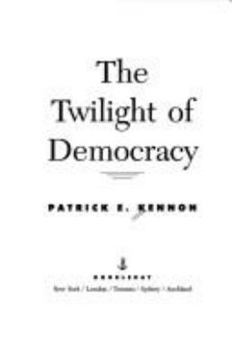Twilight of Democracy, the (Next Rpt)
Select Format
Select Condition 
Book Overview
Challenging conventional beliefs, a retired CIA analyst argues that democracy is an outdated and doomed form of government that cannot keep pace with rapid change, and that only highly trained... This description may be from another edition of this product.
Format:Hardcover
Language:English
ISBN:038547539X
ISBN13:9780385475396
Release Date:December 1994
Publisher:Doubleday Books
Length:308 Pages
Weight:0.88 lbs.
Dimensions:1.3" x 6.5" x 9.5"
Customer Reviews
3 ratings
God Bless the Bureaucrats
Published by Thriftbooks.com User , 15 years ago
This former CIA bureaucrat takes a look at countries around the globe and their political situations. He analyzes what makes a country first, second or third world in status. This bureaucrat comes to the conclusion that an efficient, honest, well-developed bureaucracy is what propels a country into the first world. Yes, he knows that people hate bureaucrats and he shows why people do. People like amateurs and heroes over professionals and experts such as bureaucrats. For instance, armies used to be based on heroism and aristocratic status, but in modern times, the bureaucratic army wins more battles than one's that are based on courage and heroism. One can take men of low social standing and drill them constantly and make them into an efficient war machine. Bureaucracies are good at achieving simple goals such as winning a war or developing an economy as long as they are not given conflicting goals, are not fighting with other conflicting bureaucracies, and are in a time of crisis when goals become simpler and necessary for survival. During peacetime, posturing politicians who are amateurs rule, goals become complex, freedom is valued over efficiency. The bureaucracy becomes inefficient. Kennon has a bureaucrat's contempt for political leaders saying that they represent the politics of the cave. They do not know much compared to bureaucratic experts, but they know how to grandstand and complain about bureaucracies. But complex first world societies need unelected bureaucratic experts to solve society's problems. If these problems are not solved, the society will fall back into the second or third world. First world societies tend to decline when they turn into democracies of groups or special interests and forget about focusing on solely economic goals of prosperity. Identity politics come to the fore and people become more interested in getting "respect" as a group or saving spotted owls rather than having a good economy. Kennon hopes that democracy will go the way of monarchies, meaning that they will only have symbolic power in the future while bureaucrats run the show. Kennon defends the legitimacy of bureaucracies national and international such as the Federal Reserve, the IRS and the WTO. He supports bureaucracies; he does not want to get rid of them. Second world countries are dominated by authoritarian political leaders who focus on economic goals solely and do not give people much freedom. In this circumstance, political leaders serve a necessary purpose and are not a sideshow to bureaucracies such as in the first world. Third world countries are dominated by the family and patron client relationships. The family is everything and the nation means nothing to the individual. Bureaucracies and political leaders are weak. The freedom of the individual is strong either as a good citizen or as a criminal. Scams and corruption increase. The only efficient bureaucracy is in the military. Military leaders often become political leaders
Offers insight into political-economic processes.
Published by Thriftbooks.com User , 25 years ago
Very enlightening examination of large-scale social processes that are otherwise hightly obscured by the common, "tribal" political-economic precepts, prejudice and self-directed propaganda.
Exellent book, thoughtful and well structured
Published by Thriftbooks.com User , 25 years ago
The book provides very good framework to analysing where your country is in its "life cycle". The driving force for its development is the balance of power between beaurocracy, private sector and the political sector. The beaurocracy (in the positive Max Weber's sense) is the basis for achieving the long-term goals of the society; the private sector provides for the freedom and initiative; and the only major role of the polititians is to control the beaurocracy and to create obstacles. The different positions of these 3 forces clasifies the country in any of the following categories: First World (prevailing private sector and beaurocracy); Second World (prevailing political sector and beaurocracy); and,Third World with prevailing political and private sectors. Very clear thought, with a lot of understanding about how the world functions. The examples from the history of different countries are secondary to the main line and should not offend the readers (at least the two times my country was mentioned I did not like the context!). Very interesting and provocative.






